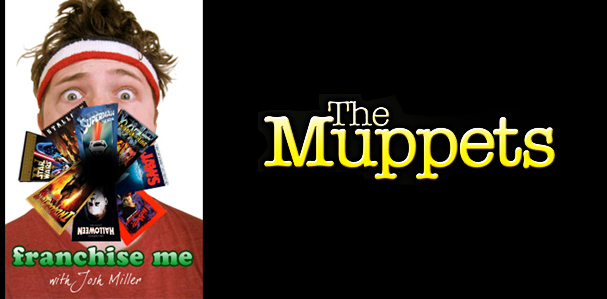
Hollywood loves a good franchise. The movie-going public does too. Horror, action, comedy, sci-fi, western, no genre is safe. And any film, no matter how seemingly stand-alone, conclusive, or inappropriate to sequel, could generate an expansive franchise. They are legion. We are surrounded. But a champion has risen from the rabble to defend us. Me. I have donned my sweats and taken up cinema’s gauntlet. Don’t try this at home. I am a professional.
Let’s be buddies on the Facebookz!
The Franchise: The Muppets — following the schtick-heavy misadventures of an eclectic race of puppet-like beings who thrive and survive amongst us in the regular human world. Birthed in the mid-1950’s by puppeteering super-champ Jim Henson for use in advertising commercials, the Muppet aesthetic/brand has since infiltrated every conceivable niche, medium and outlet imaginable, including television, music albums, motion pictures, video games, comic books, view finder stories, and literature. Since I imagine some may be disappointed to learn that I won’t be covering The Muppet Show, I figure an explanation is due… The reason is twofold: 1) While The Muppet Show is obviously where Henson’s Muppet creations solidified into the form we think of when we hear “the Muppets,” it was really just the culmination point of Henson’s success story; several of the central Muppets, like Kermit, Rolph and Gonzo, had already existed for many years by that point, as had the word “Muppet” to describe them. And more importantly, 2) TV is a can o’ worms. Why include that show and not Sam and Friends, Sesame Street, The Jim Henson Hour, Muppet Babies, Little Muppet Monsters, Muppets Tonight, etc, etc? And then there are the crazy number of TV movies and specials. It defeats the entire purpose of this column for me to pick and choose installments based on what I think is “good” or “relevant.” It is easier and frankly I think more interesting to boil the franchise down to something that is readily discussable — like the Muppets’ ventures onto the big screen. So, for the sake of tidiness, I will be battling the six theatrical feature films, plus the forthcoming The Muppets relaunch.
previous installments:
The Muppet Movie
The Great Muppet Caper
The Muppets Take Manhattan
The Muppet Christmas Carol
Muppet Treasure Island
The Installment: Muppets from Space (1999)
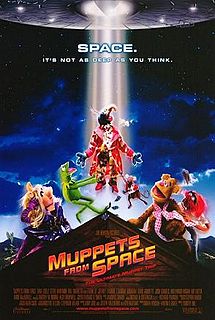
The Story:
We open with Gonzo in biblical times. More specifically the ‘Great Flood’ times. Even more specifically the night Noah is filling his Ark with animals. Gonzo wants to get on board, but Noah is all, “I need twosomes, yo!” But Gonzo, as has been established previously, is a “whatever.” Unable to identify what species he is, or produce a lady Gonzo for which to continue his genetic line, Gonzo is left alone to die a horrible drowning death. Fortunately, this was just a nightmare and Gonzo wakes up. In this reality, the Muppets all live together in a middle-class home and have no discernible occupations or career goals, other than Miss Piggy, who is an intern for a news program hosted by Shelley Snipes (Andie MacDowell) but has been lying to the rest of the Muppets, saying that she, Piggy, is the host. Meanwhile, a covert government organization run by Edgar Singer (Jeffrey Tambor) is searching for extraterrestrial life. When Gonzo believes he is being contacted by aliens, he (and Rizzo) end up getting abducted by the Feds. Rizzo is thrown into a lab rat “prison,” while Singer tries to get info from Gonzo about the aliens. Now Kermit and the rest of the Muppets must rescue Gonzo and get him to a special rendezvous where he is to meet these aliens, who – spoiler alert – are all Gonzos just like Gonzo. So Gonzo is now upgraded from “whatever” to “space alien,” which really, when you think about it, isn’t much more descriptive of a category. Meanwhile, we’re still left to wonder, is Dr. Teeth a human or a monster? And were do all the monsters come from? Are they aliens too?
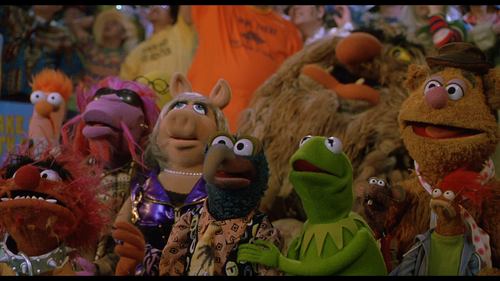
What Works:
From a creative approach, Muppets from Space has its head on straight. From the opening seconds of the film there is an indication that this will be a return to the film style of the Jim Henson Era. The Disney studio I.D. is gone. And Carol and Treasure both opened with an animated Kermit I.D…
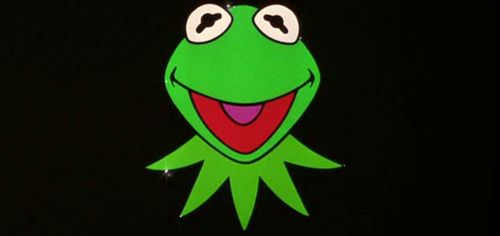
…whereas Space resurrects the classic puppet Kermit-on-the-crane studio I.D. of ole.
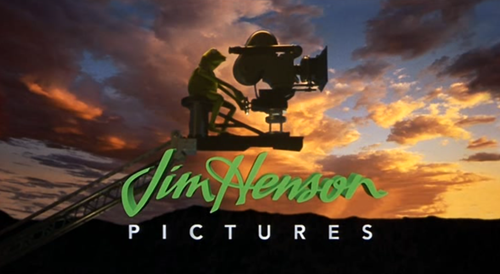
This, of course, has nothing to do with anything. But you could theorize a reasonable argument that it was the partnership with Disney immediately in the wake of Jim Henson’s death that had caused the Henson Company to seemingly lose confidence in the Muppets’ ability to carry a film all by their lonesome, without human heroes or a hook. Whatever the case, the literary adaptation gimmick is out the window. As is the use of a human protagonist. Celebrity guest stars have even slinked back in. For the first time since Jim passed away the Muppets are the stars of their own film. The one carry-over from the Brian Henson films is the continuation of Gonzo (with sidekick Rizzo) as the centerpiece Muppet instead of Kermit. Generally I would be wary of a Gonzo-led film, as the character is at his funniest when he’s allowed to be fringe, but given that a key aspect of Space is comedy mined from how crazy Gonzo is acting, headlining his own story doesn’t prevent Gonzo from being Gonzo. So that’s nice.
Aside from the literary adaptation thing, I’d say the most notable change to the post-Jim (PJ) Muppet films has been the semi-retirement or notable downgrading of many of our previously prominent figures — Rowlf, Scooter, The Electric Mayhem (except Animal), and most conspicuous, Kermit. Naturally, is seems logical, or at least inevitable, that characters from elsewhere in the greater Muppet universe be brought in to fill the gaps. Though pairing him with Gonzo was out of left field, Rizzo was still a rather organic addition, given his large role in Manhattan. Space is the first PJ Muppet film to make some wholesale additions. Here we have three new Muppets (who had all appeared on Muppets Tonight, the late-90’s attempt to reboot The Muppet Show) elevated to the same screen-time relevance as our old gang: the feisty and diminutive Pepe the King Prawn, the boobish Bobo the Bear (playing Jeffrey Tambor’s sidekick, Agent Rentro), and Clifford the, uh, Rasta-guy? There have always been so many supporting Muppets coming and going, that tossing in new ones is part of the fun. But elevating multiple puppets to main character status could be problematic. Largely though it isn’t. Pepe is a great character. Bill Barretta’s unique ambiguously Spanish voice for Pepe is pretty genius, making almost every single Pepe line funny, regardless of the writing. Barretta’s other character, Bobo the Bear, is a pleasant addition too and his semi-clueless laid-back attitude makes for a nice foil to Tambor’s neurotic rage. And though not a major addition, I dug Brian Henson’s Andy Dick lookalike Muppet, Dr. Phil Van Neuter, who attempts to suck out Gonzo’s brain in a government laboratory. I’m glad to discover the Andy Dick thing isn’t just me. I was going to whip up a side-by-side comparison in Photoshop, but someone already did it for me…

When the movie can get comfortably into position it works just dandy, and there are some great moments spread throughout. Rizzo’s subplot as a lab rat is pretty hilarious (when it isn’t being ruined by David Arquette), played as a prison movie parody, complete with a Shawshank Remption nod. I always like seeing Piggy get violent, so her knock-down martial arts brawl with Josh Charles’s Man in Black gave me a giggle. Bunsen and Beaker, who I felt were used a bit above their pay-grade in the previous two films, are given an appropriately silly bit where they stock Kermit up with action gizmos, like Q from the Bond films. When the aliens animate Gonzo’s sandwich (turning it into a talking sandwich), is a perfect use of Muppet tech. Ray Liotta has a cute scene as a mean security guard that gets sprayed with a chemical that makes him excessively friendly. And though it is an incredibly minor moment, when we see the Electric Mayhem leaving to play a bar mitzvah, having Animal yell “Oy” as he passes by shows that the ol’ flavor is still there. Which also unfortunately highlights the fact that Space…
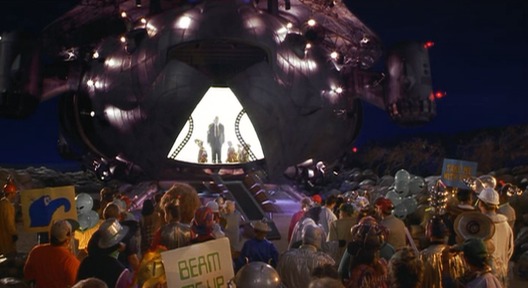
What Doesn’t Work:
…is a wholly mediocre film otherwise.
One could look at the unorthodox format of the Brian Henson films as a necessary step in revitalizing the Muppet brand after his father’s death; some growing pains, if you will. And for better or for worse, the brand was indeed revitalized — Treasure was a huge hit; the second highest grossing Muppet film ever. Then Space suddenly killed the franchise, taking in almost half as much money at the box office ($16.6 mil) as the previous lowest grossing film, Manhattan ($25.5), which opened on one thousand less screens and was dealing with 1984 ticket prices (had Manhattan opened in 1999 it would’ve made $40 mil.) Obviously, as we all know, box office doesn’t not preclude or validate the quality of a film. But popularity also isn’t irrelevant, especially when we’re dealing with something like the Muppets. You could argue that this is a case of the Brett Ratner Paradox. (This summer Ratner bragged that his X-Men movie, X-Men 3, made more money than X-Men: First Class, failing, apparently, to realize that his film’s huge opening weekend was due entirely to the goodwill engendered by Bryan Singer’s two films, and that First Class‘s poorer showing surely had a lot to do with audiences’ opinions on Ratner’s film, which had a huge drop-off after that big opening weekend, and Wolverine. This, of course, is a great example of how Ratner is a douche.) Maybe audiences hated Treasure in reality, deciding that they were now done with the franchise. I don’t think so though. I think Space just didn’t look that appealing (especially to kids now raised on the literary adaptations), and those who did see it clearly didn’t flood their schoolyard or break room with praise about how amazing the film was. Space had stiff competition at the box office, $16.6 million indicates no word of mouth. Or at least no positive word of mouth. For comparison, the live-action Inspector Gadget movie came out the following week and wound up earning $134 million. So what happened?
Honestly, there isn’t much insightful or witty to say here. Space simply isn’t that funny. It isn’t garbage by any means. But it is disappointing enough to make me wish that they’d stayed with director Brian Henson and the literary adaptations. Maybe Muppets of Wrath or The Great Gonzo Gatsby could have been a blast. That said, I do think the film has some flaws that were going to be semi-troublesome even if it had snappier dialogue and better execution…
Though diehard Muppet purests surely place Space above either of Brian Henson’s films – which had the sacrilegious audacity to sideline the Muppets – watching Space immediately after Treasure rather handedly demonstrates how much more important being funny is, overall, than doing things “properly.” I love seeing the Muppets behind the wheel once again, but I would have loved laughing and not being bored significantly more. It seems there were a lot of behind-the-scenes misfortunes that undid Space during production, most unfortunate purportedly being the film getting rushed into production to make a pushed-up release date. But, regardless of the reasons, excuses, and the fact that the film has its heart in the right place, the final result feels not so much half-assed but half-there — from the writing to the production design, the movie feels slight on all fronts except for the spectacle of the actual alien landing during the climax (which isn’t the kind of spectacle one watches a Muppet movie for anyway).
Space is the first Muppet film that isn’t a musical. There is plenty of music featured in the film, but none of it is original, and even more upsetting, none of it is sung by the Muppets, aside from a cover of Kool & the Gang’s “Celebration” by Gonzo’s alien brethren. For some reason director Tim Hill decided that the film should have an all funk soundtrack. I love classic funk. And the idea of an all funk Muppet movie certainly excites me. But that’s cause the idea makes me assume someone will be writing original funk songs for the film. As it is, the constant funk music is weird; not necessarily on its own terms, but watching these films as a franchise it is a noticeable and unfitting change-up. Funk is such a specific subgenre of music that dedicating your film’s entire soundtrack to it is going to be conspicuous, and thus it should be fitting. It’s not like Gonzo has previously been associated with funk. In Space it feels kind of random. And given the dated quality of funk, it also feels kind of lame. Had the Henson Company hired someone to pen a host of new funk tunes, the movie could have been a blast (though I still would have wondered, “Why funk?”).
Had Space‘s script been whip-smart and hilarious, I could have forgiven the lack of songs. Sure, I would have lamented their absence, as music is part of the basic Muppet fabric (no pun intended), but I’d rather have no songs than crappy ones. And I’m always into the spirit of shakin’ shit up. But the movie just isn’t very good. The number one problem is that Space‘s pacing is not up to snuff for what we should expect from a Muppet film. When the film tries for laughs it usually succeeds at least on a low level, but the big or clever gags don’t come fast enough. Mostly the film seems satisfied aiming for very modest laughter. I don’t think Tim Hill is an ideal match for the Muppets. As a writer Hill worked with Stephen Hillenburg on Rocko’s Modern Life and then moved onto Hillenburg’s opus Spongebob Squarepants, which is undeniably genius children’s programming. But its a very different kind of comedy. Hill has certainly found the most success as a filmmaker when aiming squarely at kiddies — Garfield: A Tail of Two Kitties, Alvin and the Chipmunks, Hop. I could imagine Space delighting children, as it is quite broad and colorful, but as an adult with zero nostalgia attached to the film I routinely found myself bored in places.
Kermit. Oh, Kermit, Kermit, Kermit. What should we do with you? To add to the vocab glossary along with the Brett Ratner Paradox, there is something I would call the Mickey Mouse Factor that we often see in comedic ensembles like the Muppets — to put it succinctly, your hero should always be the least-whacky member of an ensemble (with Mickey Mouse being the most extreme, ie boring, example). There are a variety of logical reasons for doing this, but as far as comedy is concerned the main reason is that not being the protagonist allows funny characters to be even funnier because you’re not asking the audience to directly identify with them. This is a logic gap that oddly seems to continually elude TV producers when making spin-offs — Joey was doomed from the start, I’d say, because Matt LeBlanc’s cartoonishly moronic Joey was not appropriately sustainable or transferable to becoming the central character. Conversely, the best protagonists often do not work well as supporting characters. You couldn’t have made a good Kramer spin-off of Seinfeld any easier than you could have gotten audiences to fall in love with Jerry Seinfeld’s Jerry as a supporting character. This issue was present in the Brian Henson films with Kermit, but was also obscured by the films being literary adaptations with existing famous roles that needed filling. According to the interwebz, the original idea for Space was going to be titled Muppets In Space (no doubt inspired by The Muppet Show‘s popular “Pigs in Space” segments), and was to be about a group of aliens abducting Kermit, assuming that he, being a ‘little green man,’ was an alien himself. Then the other Muppets had to figure out how to rescue him. Personally, I think that would have been a much smarter story to do. Gonzo functions well-enough here as our hero, but Kermit does not function well as a supporting character at all. Had I never seen a Muppet movie before, I probably would have wondered why they were so heavily featuring this rather dull character, when the rest of the Muppets all seem much more entertaining. Kermit’s personality evolved to be that of the central figure, the every-Muppet.
Speaking of characters that I wondered why Space was so heavily featuring — Clifford, voiced by Kevin “Elmo” Clash. This character is just terrible. He has no defined schtick or describable personality, and he adds nothing but the color purple to scenes that he is in. I have no idea why they featured him so often.
But back on topic… Another reason the Muppets In Space film would have been better is that the entire idea of Gonzo longing to find his roots and learning that he is an alien does not quite sit right. It feels like the kind of story that someone would toss out in a TV writers’ room meeting on a show that’s already in its fifth or sixth season and running out of fresh ideas, “Uhh… what if we finally explore what exactly Gonzo is?” It isn’t that it is a bad idea, but there is something kind of desperate about elevating and simultaneously eliminating a minor running gag like Gonzo’s “whatever” status. This is adding some extreme continuity to an otherwise continuity-less franchise. And thematically the whole film builds up to the emotional blue-balls moment where Gonzo declines the aliens’ offer to go with them, because his family is the Muppets. On a dramatic level Gonzo’s decision happens so suddenly that it almost feels rude (dude, these aliens went through a lot of work to find you; at least go with them for a short trip. Are your parents still alive?). But in a deeper franchise sense, it feels wrong. Apparently in an earlier draft of the script the aliens turned out to be mistaken, leaving Gonzo still unsure of what he is and retaining his “whatever” status. That feels more akin to the greater Muppet franchise to me. Like with Caper, the Muppets certainly don’t need to be in show business, but having a story the rests so entirely on Gonzo and his longings (instead of a larger or more dramatic conflict) made it hard on the film.
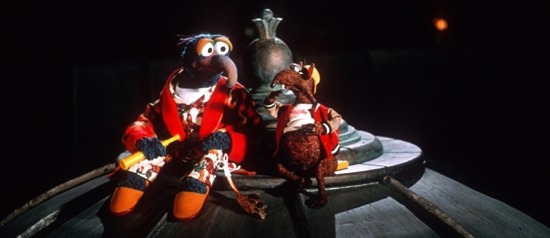
Celebrity Cameo Count: 10
Best Celebrity Cameo: F. Murray Abraham as Noah; mainly just cause the inclusion of F. Murray Abraham anywhere is always a good idea.
Best Pun:
Ed Singer: No nostrils. How do you smell?
Rizzo the Rat: Awful. Trust me, I’m his roommate.
Worst (aka Best) Fozzie Joke: Not applicable.
Most Ridiculous/Bizarre Joke: The awesomely dated appearance of Joshua Jackson and Katie Holmes as their Dawson’s Creek characters.
Best Meta Moment/Line: Nothing comes to mind.
Joke No Child Could Understand: Nothing is really beyond children here.
Sadly Under-Featured Muppet: Okay, I realize it is awkward for you guys cause Jim Henson died, but seriously, Rowlf says one thing and fucking Clifford gets a couple dozen lines? Come on.
Should There Have Been a Sequel: I hate to say it, but if this is what we’re going to get, I think it is time for the Muppets to stick with television, where the expectations and stakes are lower.
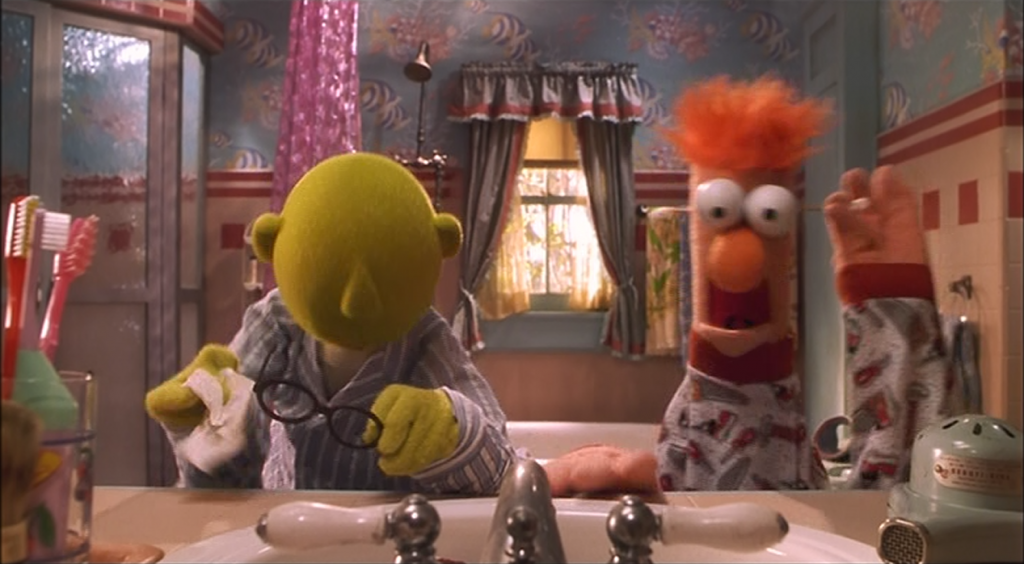
Up Next: The Muppets
DISCUSS THE FRANCHISE ON THE BOARDS
previous franchises battled
Critters
Death Wish
Hellraiser
Leprechaun
Phantasm
Planet of the Apes
Police Academy
Rambo
Tremors